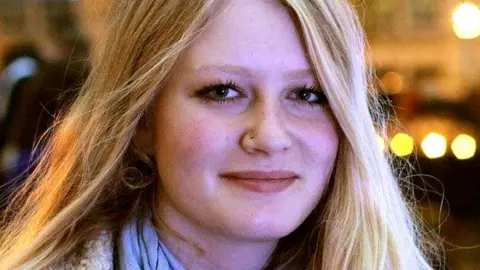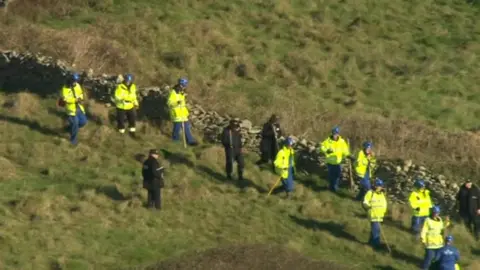Gaia Pope: Police inspector 'frustrated' by lack of officers in search for missing teen
 PA
PAA police inspector has told the inquest into the death of missing teenager Gaia Pope he was "frustrated" by the lack of officers available to search for her.
Inspector Andrew Alkins also told the court it was a mistake the 19-year-old had initially been treated as a medium-risk missing person.
Mr Alkins said after reading her medical records he raised the status to high risk when he began his shift.
Miss Pope, who suffered with severe epilepsy, died of hypothermia.
Dorset Coroner's Court was previously told there was a near three-hour delay to open a missing person report after the alarm was raised by the teenager's aunt, Talia Pope on 7 November 2017.
Mr Alkins said he learned of the college student's case at 01:16 GMT the following day and, having read the background, upgraded her to a high risk missing person eight minutes later.
"My view was it was the wrong grading.
"My view was she should have been placed at high risk," he told the inquest's jury.
"I think there were a number of factors at the time. From memory, it was the medical records, the epilepsy, I was seeing mental health and I thought there was a lot of vulnerability."
'We were frustrated'
He told the court he had contacted the on-duty force incident commander, chief inspector Peter Beashel.
"We were frustrated because we both knew the time, we had very limited resources," Mr Alkins said.
"When you push someone to high risk, you treat it like your own family that has gone missing and throw what assets you have at it.
"That drains the force.
"We were frustrated by the fact we didn't seem to have enough intelligence and information and we needed to get more, and we wanted to speak to family members again."

Ms Pope phoned the police again shortly after midnight on 8 November for an update and was told by a call handler four officers and a helicopter were out looking for her niece, the court heard.
But Mr Alkins said: "From my recollection, I would not recount four officers being out.
"I don't think there was four officers out.
"Knowing the officers, whatever number there were, they would have been out searching."
Mr Alkins said he felt he "did his best" with the resources he had available.
"I didn't have the luxury of someone having an abundance of officers to start acting as family liaison officers, setting up intelligence units and deploying a co-ordination helicopter.
"I made the best of what I had at that time in the morning."
'I gave instructions'
Mr Alkins agreed he should have recorded more information on the police logs before his shift ended.
He also told the court he had been co-ordinating officers searching in the area, while attempting to obtain more information from the teenager's family and speaking to the force incident commander.
Rachael Griffin, senior coroner for Dorset, asked: "There is no reference in any of the papers to those tasks you told the jury about.
"Did you definitely conduct all those inquiries you told them about?"
He replied: "I didn't but others did. I gave instructions and the force incident commander did."
The college student's disappearance sparked a large search operation in the Swanage area involving the police, Coastguard, National Police Air Service, Dorset Search and Rescue, and members of the public.
Eleven days later, on 18 November, her body was found by police search teams in undergrowth between Dancing Ledge and Anvil Point, close to the coastline.
The inquest continues.

Follow BBC South on Facebook, Twitter, or Instagram. Send your story ideas to [email protected].
